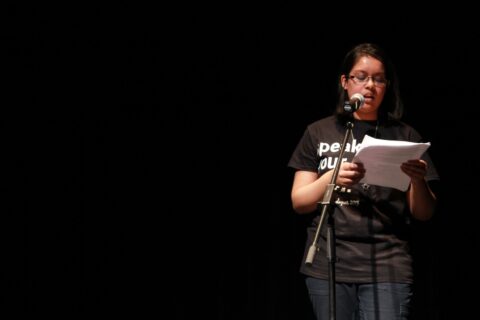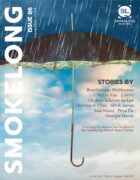Nadiya is from Detroit while Ali is Arab and Persian and Areeba is Bangladeshi. How important was it for you to choose characters who might not come from the same geographic area or ethnicity but share a bond?
It was a deliberate choice to have these characters hail from different places and be of different ethnicities. I’ve always cherished the diverse backgrounds of my friends, and it was intentional that they’d be of these particular identities, deeply aware that I am of the negative connotations of being a Black Muslim, a Bangladeshi femme, and an Arab-Persian non-binary. But I wanted these characters to embody, despite everything, agency, grit, creativity.
On a lighthearted note: Having studied Arab and Persian literature, the idea of someone of that origin not really knowing poetry was a funny thing for me to write.
What is the significance of setting your story in a university campus?
As I mentioned in our correspondence, schools serve as a central site in all my work. They are the established place for learning that morphs into sites of tension, elitism, and entitlement. Personally, I’ve found myself increasingly ambivalent toward school since I started my doctoral journey. Schools and their curricula have never not been used as tools of manipulation, control, and discipline, especially in postcolonial contexts, but universities have also contained, then fomented, the seeds of revolution, which is exceptionally profound and remarkable.
There are many heartbreaking incidences within your story, but I kept returning to the lack of meaningful participation in the workshops and the People of Color Monologue organized by Nadiya and Areeba. Why do you believe there was little interest?
I finished this story in July 2024, when Bangladesh was going through a period of massive civil unrest (a genocidal massacre, actually, that the fascist Awami League, with the help of Modi’s equally authoritarian, propagandistic government, orchestrated). Young students took to the streets to protest Sheikh Hasina’s brutal, brutal crackdowns, which resulted in the deaths of over two thousand people and countless others shot in the eyes. It’s the world’s first Gen Z revolution, which is heartbreaking to consider. Why should middle-schoolers and kindergarteners go out protesting in the first place?
As a Bangladeshi living abroad, I’m hyper-aware of how little space we’re afforded as people, thinkers, artists. I felt so stuck: as a Muslim, as a survivor of state-based violence, as someone without American citizenship who’s been molested and sexually harassed, as a queer POC with no words white people have ever given a damn about. This piece was a way of reclaiming agency while knowing that classrooms and auditoriums remain near empty when academics and artists—even popular ones—deliver lectures. Everyone’s clambering for the bars instead.
The theme that leapt at me while I read your story was “inclusiveness.” Did you begin the story with an idea to explore that concept?
As a matter of fact, I did. Increasingly, safe/inclusive spaces are getting institutionalized and appropriated by the universities, subsumed into structures that rob these places of meaning and engagement. It’s disillusioning. But disenfranchised young people will always find a way to connect and take initiative; we’ve seen that happening in Bangladesh, Sri Lanka, Iran, Egypt, everywhere. At the University of Michigan, my current institution, there’ve been countless pro-Palestine protests and encampments since last year, spearheaded by extremely courageous, resilient students. They’ve vowed to continue the fight until Zionism is finally dismantled.
I was also inspired by Frances and Bobbi’s dynamics in Sally Rooney’s Conversation with Friends. Nadiya and Areeba are also obviously kind of mediocre performers, just like I was when I tried spoken word that one time my first year. I don’t even have the paper where I wrote this large, obtuse poem. I have only a vague recollection of presenting. There’s a candid photo, though (posted here).
I love the different foods mentioned in the story, from bean pie to drunken noodles, from falafel to kunafeh. Like the people in your story, the foods too are diverse. Did you see the food as a tool to bring the people in your story closer?
I love food from different cultures, and I spend all my time thinking about it, discussing it with my cookaholic mom, reading about it. But as someone with a chronic eating disorder, I have a complex relationship with eating, which I’m still trying to grapple with. Areeba does, too; it’s depicted subtly, which is why her friends nourish her with things she can enjoy. Nadiya finds great comfort in baking, especially bean pies, a staple in many Black Muslim communities because it doesn’t require alcohol. And, of course, food is political. It’s no coincidence that they all go out to have a celebratory dinner toward the end at Jerusalem Garden, a Palestinian restaurant in Ann Arbor. Palestinian food and culture are revered and enjoyed by my characters and myself. And Palestine was weighing heavily on my mind as I wrote this. That’s why the narrative feels like a compressed structure, stuck on a moment that keeps recurring and traumatizing Areeba, similar to—on an infinitesimally small scale—how the timeline of last year for everyone collapsed completely at the relentless bombardment and genocide of Palestinians, turned devastatingly cyclical, revealing the sham that’s Western liberalism for good.
Do you see yourself developing Areeba and Ali’s story further? What are you working on next?
As of yet, I haven’t thought of expanding Areeba and Ali’s story. Though I’ve a propensity toward writing unrequited love stories, this couple’s in for the long haul: OTP, canon, extant in all the parallel worlds of this universe.
I’m currently trying to finish a genre-bending campus novel set at the University of Michigan called Limerence. It’s a lot of things, but it’s a very bookish book with pretty dense meditations on some French literature (and political rebellions and pop culture and Chicago …). I hope to have the draft solidly standing next summer. I proclaimed it! Now I must. Wish me luck.



 The SmokeLong Grand Micro Contest (The Mikey) is now an annual competition celebrating and compensating the best micro fiction and nonfiction online.
The SmokeLong Grand Micro Contest (The Mikey) is now an annual competition celebrating and compensating the best micro fiction and nonfiction online.